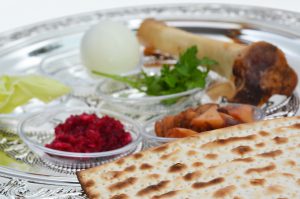Pesach Prep Panic
As I walked into a store a few weeks ago, I got a chill and I shuddered. That’s right, the store was setting up the shelves for Pesach, and I felt uncomfortable. What’s that about? We all want to get in the holiday spirit, so why when it’s Chanukah are we all smiles, but come Pesach we become anxiety-riddled and break into a cold sweat?
Cracking the Code on Passover Preparation Stress
You might say it’s the cleaning and fear of potentially transgressing the issur of Chametz, but we generally over-clean and go to extremes. We know what to do, and we know we go overboard with many aspects of it. If we’re honest with ourselves, that isn’t it.
It could be the eternal Jewish fear of not having enough to eat. Certainly, there are people who are starving and struggling, but even the ones who have plenty of food, Baruch Hashem (Thank God), get the pre-Pesach sinking feeling. What will I snack on? What about trips? How can you use matzah as a hot dog bun???
The food issue is a real one, but do any of us want to admit we’re that shallow that all we think about is food? Someone recently told me an interesting approach to the Seder he’d heard:
More Than Just Matzah Madness
We don’t simply say, “They tried to kill us, we won, let’s eat.” Rather, the eating at the Seder is quite specific. From the necessity of drinking four cups of wine, to eating Matzah not once, not twice, but three separate times (Matzah, Korech and Afikoman). We eat vegetables dipped in salt water, and we eat bitter herbs. Why the obsession with eating tonight?
He answered that on Pesach we celebrate our freedom. However, we didn’t go from having a master to not having one. Instead, we went from having a horrible master, Pharaoh, to having the best one possible, Hashem. And who is responsible to feed a servant? His master.
Well, Pharaoh, despite what the rabble-rousers said later in the Wilderness, did not lavish food on the Jews. In fact, their meals were supplemented with the fish Hashem miraculously supplied to the women when they drew water. It seems, then, that when we eat at the Seder, we’re doing so mindfully and intently, recognizing that food is not just a means to keep us alive, but an opportunity to connect with our master, Hashem.
The Gemara in Sanhedrin (108b) learns that the dove brought an olive leaf back to Noach, as a prayer to Hashem, “Let my food be as bitter as olives but come from You.” This further cements this concept.
The Yetzer Hara: Mastermind Behind Passover Preparation Stress
The problem with this though, is that we should be happy when Pesach arrives, recognizing our shift from being the servant of Man to becoming servants of God. Why, then, do we get the dread and gloom feelings?
It would seem to me that the phenomenon can be explained with something we’ve spoken about in the past, that the more beneficial something is, the more the Yetzer Hara (Evil Inclination) tries to undermine it. Consider people’s feelings about Birkat Hamazon, bentching (Grace after Meals). Or their perceptions of Tachanun, especially on Monday and Thursday. Those days were chosen for a more involved and lengthier Tachanun prayer because they are times of Divine desire, when Hashem is looking to bless us and save us. Why then do we look for reasons to skip it?
Bentching is said to be a source of myriad blessings, but people avoid it like the… well, ten… plagues. It seems that whatever is a great spiritual opportunity is a target of the Yetzer Hara. Knowing this means that when we feel less than enthusiastic about something, it’s probably because it’s an amazing chance for us to grow.
Embracing the Spiritual Opportunity Amidst Passover Preparation Stress
Thirty days before Pesach we begin learning the laws on Pesach. It’s supposed to get us into the Pesach spirit. What is that spirit? It’s the appreciation and excitement of a person with a whole new future opening to him. There may be a bit of trepidation because of the magnitude of responsibility, but the upside potential should help us brush off any concerns.
Each year, we relive the rush of a new hire on the first day of the job; the anticipation of what you can achieve and the lifetime of success ahead. Don’t let the Satan harsh the vibe and cause you to miss out. Capitalize on it and attack the year ahead, seeking all the opportunities for connection and growth. As you say the brachot (blessings) on the food you eat, remember Whose food you’re eating and why: because He wants to take care of you and be close to you. Definitely a reason for a Chag Sameach!
By Rabbi Jonathan Gewirtz
Rabbi Gewirtz (Operation Inspiration) welcomes comments and feedback. Write to him at info@JewishSpeechWriter.com to share your thoughts. You never know when you may be the lamp that enlightens someone else.


